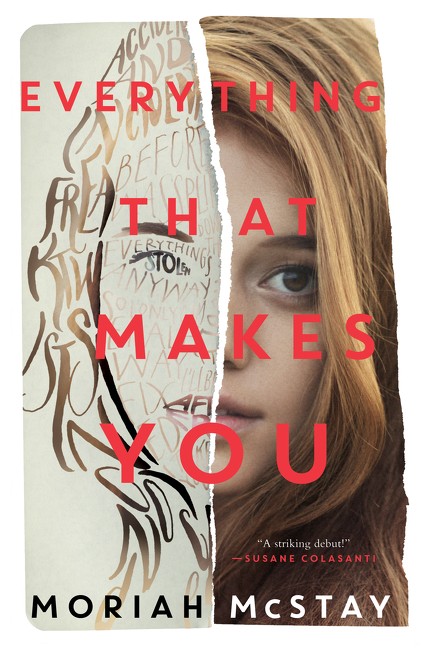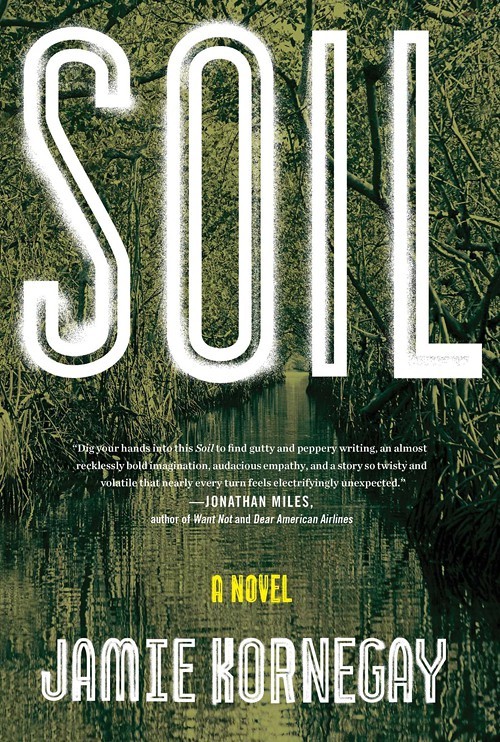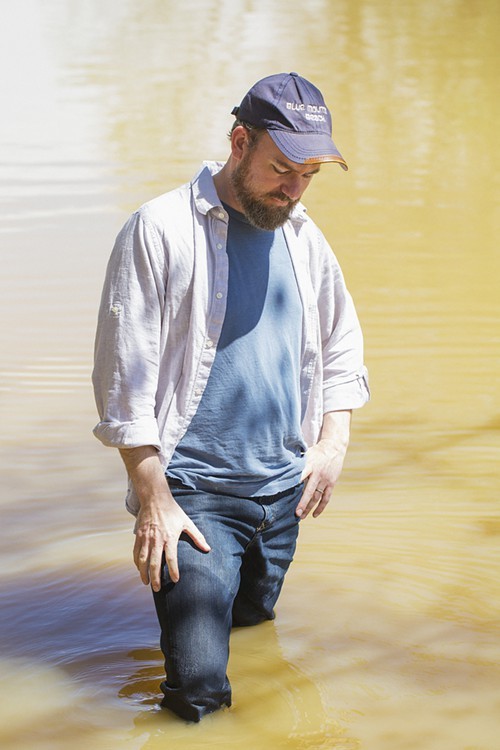This week, The Booksellers at Laurelwood is hosting a pair of rhyming fiction writers, both of them with Memphis ties and both of them out this month with debut novels from front-ranking national publishers.
Onsite at the Booksellers on Tuesday, March 17th, at 6:30 p.m., Moriah McStay, who grew up in Memphis and lives here with her husband and daughters, will be discussing and signing her young-adult novel Everything That Makes You (Katherine Tegen Books/HarperCollins).
At story booth (438 N. Cleveland), on Wednesday, March 18th, at 6:30 p.m., Jamie Kornegay — the latest writer in the Booksellers’ “Literary Tastemakers” series — will be reading from and signing Soil (Simon & Schuster).
[jump]

McStay’s book is indeed aimed at young adults, but it’s such an accomplished debut, no reason it can’t be enjoyed by adults as well. The book starts out as the story of a high school, college-bound teenager named Fiona Doyle, whose facial injury as a 5-year-old at the Memphis Zoo has had a profound effect on her childhood and young-adult life. What if that injury had never happened?
That’s another story — the story of a high school, college-bound teenager named Fi Doyle, and Everything That Makes You describes that story too. McStay’s strategy here? Have readers follow both story lines in alternating chapters, and if that’s demanding at first on the reader, those paralleling, independent narratives — sharing many of the same characters — work effectively soon enough. Many local readers will also be right at home in these pages. Major scenes in Everything That Makes You take place in that Midtown coffee shop known as Otherlands.
. . .
Don’t know if Jamie Kornegay has ever been to Otherlands, but when he was in high school he made the trip from Batesville, Mississippi, to Memphis (where he was born) on weekends as movie reviewer for his town newspaper, The Panolian, so his signing on Wednesday will be a kind of homecoming. Kornegay, in a recent phone interview, still has fond memories of Memphis, which he described as “the first city I got to explore.”
If there isn’t much time this month for Kornegay to explore other Southern cities, it isn’t because he won’t be traveling to them. It’s because he’ll be busy reading from and signing Soil and moving on. That book tour kicked off March 10th at TurnRow Book Company in Greenwood, Mississippi.
When we spoke on the day before the tour, the kickoff at TurnRow was certainly appropriate, since Kornegay and his wife, Kelly, are co-owners of the store and have been since it opened nine years ago in a handsomely restored historic building in downtown Greenwood.
“It’s kind of weird,” Kornegay — who spent several years as a bookseller, events coordinator, and radio show producer at Square Books in Oxford — said of being an author signing in his own store. “As a writer doing a book signing, you smile and sign. At signings at TurnRow, now I have to worry: Did a customer already pay for the book? Are we supposed to mail it?”

No question, though, that TurnRow’s been a welcome addition to Greenwood and the town’s literary scene. According to Kornegay, “My wife and I moved here, because it seemed Greenwood was undergoing a renaissance with the Viking range factory, the Viking cooking school, new restaurants. We’re still here and doing strong.”
“Doing strong” is not how anybody would describe Jay Mize, the man at the center of Soil. You can briefly read about him in the March 12th issue of the Flyer. But the novel, which is being highly praised, for good reason, by trade publications, independent bookstore owners, and especially other writers, didn’t begin with Mize. It was inspired, according to the book’s author, by a single image:
“I used to live in Water Valley and drove to Oxford every day. One season it rained a lot. The landscape was flooded — very beautiful but destructive. I passed a stump sticking out of the mud, and it looked to me like a corpse. With that mistaken image, a scenario began to unwind. A story about a young guy, like myself … and something to do with Crime and Punishment, an important book for me. But also the idea of a cover-up. That was really it: the idea of covering up a crime — or supposed crime, we don’t know for sure in Soil. A character, Jay Mize, was born.
“From that initial image and thoughts, the story just tumbled around in my mind, but I wanted Soil to be about more than a dead man and a cover-up. It took some working out. It took living some, moving to Greenwood, opening the business, starting a family. I’m 40 years old. Life takes on new meanings.”
Soil deals with the latest thinking on sustainable farming, and Kornegay admits to being inspired by Michael Pollan’s The Omnivore’s Dilemma and the experimental methods described in Dickson Despommier’s The Vertical Farm. He’s done some gardening himself, and he studied up on biochar: homemade charcoal meant for enriching soil. Jay Mize tries his hand at biochar in Soil. Kornegay has too.
“I used deer bones,” he said. “I made a retort out of a barrel to prove that you can make charcoal out of bones in your own backyard and without a lot of smell or smoke. It was a gruesome experiment. The details in Soil [and those aren’t deer bones in the novel] ring a little too true maybe.”
As a sometime comic, sometime creepy foil for the central character Jay Mize in Soil, there’s Danny Shoals, sheriff’s deputy in Mississippi’s Bayard County. He’s an entertaining contrast to Mize, the dark lead character, and that’s what Kornegay designed Shoals to be. Then there’s Mize’s wife, Sandy, who sticks by her husband until even she is forced to move off the failing farm and into town with the couple’s young son. Kornegay said Sandy was perhaps the hardest character for him to write and get right:
“She has to walk this middle ground between my other characters’ hangups and obsessions and inertia. She had to be the moral center. It was a tricky line to walk.”
Kornegay grew up in Batesville but not, as Soil would suggest, on a family farm. At home, he read a lot — mostly his mother’s mysteries — but in school, a teacher “turned him on” at a young age to Crime and Punishment. He also kept up with the new crop of Mississippi writers who were just then earning major national attention:

“When I was in high school, John Grisham and Donna Tartt were just coming out — Tartt from Grenada, just up the road from Greenwood. I was so excited. These were Mississippi writers! One of the first signings I went to was at Square Books, for Willie Morris. We had access to these writers. Larry Brown. Richard Ford. You never knew who’d walk in when I worked there. You could talk to them, ask questions, listen.”
As an undergraduate at the University of Mississippi, Kornegay worked with his share of exceptional writing teachers as well, chief among them Barry Hannah. Kornegay had this to say of the example Hannah set:
“The way Hannah spoke … he spoke like he writes. That as much as anything … and the electricity in his prose … the music of his writing. Hannah was very much into jazz, and he tried to replicate those rhythms in his prose. He taught good taste. He always looked for the off-kilter. He showed us what was interesting in literature … the work of Raymond Carver, Tim O’Brien. He even taught his own book Airships, and who better to teach it?”
Among his own generation of writers, Kornegay mentioned Memphian Jeff Stayton, whom he knew from Square Books, and M.O. Walsh, who also attended the University of Mississippi — writers, in Kornegay’s words, “I was coming up with.” All three have had remarkable debut novels published within the past few weeks.
Kornegay’s path to publication he described as “a long process,” but once he secured an agent, things happened:
“I had two novels before Soil. I tried to get them into the ‘loop,’ but I guess I knew deep down they weren’t ready. This one I thought was ready. I picked my agent, because I’d liked his comments in an interview he’d done. I set my sights on him and didn’t give up. He had suggestions for the manuscript. I took him up on those suggestions, and he took the book.
“It was an exciting process, a kind of feeding frenzy,” Kornegay said when Soil was ready for prospective publishers. “The agent sent out the manuscript to several of them, and Simon & Schuster was most interested. I was kind of blown away.”
These days, Kornegay already has another novel in the works. In fact, it’s halfway done. And despite the big buildup to Soil’s publication and the book tour this month, the author knows you have two options while waiting for a book’s official release date:
“It’s a long lead time. You can sit around chewing your nails for two years, or you can get busy writing the next one.”
The next one, Kornegay explained, won’t be set, as Soil is, in his home state’s hill country, and the business at hand won’t be alternative, small-scale farming. The story takes place in the broad flatland of the Mississippi Delta, and the farming is large-scale. What goes into working on such a scale? According to the author, a thousand acres per man is the way it’s done. But the way Kornegay sees it, Soil and the novel he’s working on are mining similar territory, and you start from the ground up.
“Planting, growing … it’s a rich ground for metaphor. And the best way to make the story natural is to get your hands into it. Years of your life, obsessions, passions: It all gets filtered in.
“But as a writer, it’s like doodling. You start off with one thing, one little squiggle, and by the time you’re done, it’s this whole thing you’d never have envisioned. Then you revise — and revise — until it all sounds true.” •